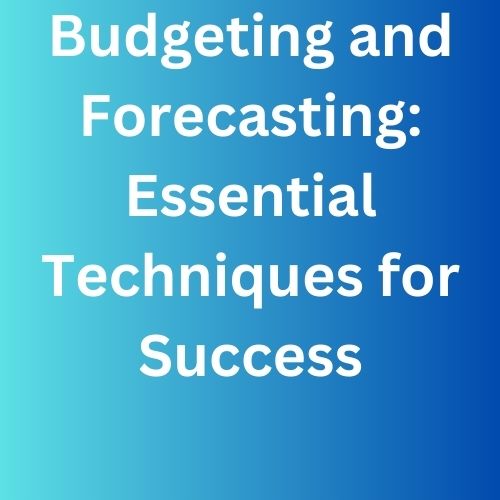
Budgeting and Forecasting
Introduction to Budgeting and Forecasting
Welcome to HubWorld, we will be discussing about Budgeting and Forecasting, definition, types, benefits, challenges, key differences and steps in create budgeting and forecasting.
What is Budgeting
Constructing a budget is the process of planning how to spend and save money for a purpose. Allocating money or keeping tabs on earnings and outlays are all part of setting a financial objectives. Individuals and businesses all need budgeting in managing their money well either by setting aside money for future objectives or lowering debts or setting spending priorities.
Types of Budgets
For a given time frame to show the cost and income this represent an operating budget. For an assets which is associated with long term cost this represent capital budget. For a monthly, weekly or daily basis of inflow and expenditures this represent a cash budget. For allocation of a comprehensive budget to various departments this represent a master budget. For an activity levels that need to accomodate variations this represent flexible budgets. There are new time periods that need justify spending this represent a zero base budget. A budget from the prior periods that shows increases or decreases in spending base represent an incremental budget.
Benefits of Budgeting
To aid money management it helps keep track of earnings and outlays. For future aspirations and emergencies it helps put money aside. It helps in aids of financial objectives of an establishment. When you set your spending priorities, it help cuts down overspending. For prudent expenditure allocations it enhance fiscal cognizance by pinpointing domains. If you need cost on house purchases or retirement funds or schooling it supports a long term budgeting. Hence reducing financial stress it provides a transparent financial management road map.
What is Forecasting
Forecasting is a process whereby upcoming occurences or trends are determined using the past data. Statistical and mathematical models are use in making educated projections. For weather forecasting or economics or finance, or a corporate planning these tools are use frequently.
Types of Forecasting
Qualitative forecasting means using past data to serve as the foundation for expert judgement and surveys. Time series forecasting is whereby future patterns are predicted using past data. To determine causal forecasting consider these tools such as marketing techniques or economic situation or demographics. Judgmental forecasting is use to determine an individual viewpoints inside an organization. Quantitative forecasting predicts future events using mathematical models and algorithms.
Benefits of Forecasting
Forecasting is use to assists companies determine market patterns, possible hazards and advantages. Forecasting is use to boost the operation performance, improve planning and resource allocation. It is also use to boosts competition among rivals in order to stay ahead of them. To increase productivity and profitability, forecasting aids in establishing reasonable objectives.
Challenges in Budgeting and How to Overcome Them
There are inadequate departmental correspondence and financial fluctuations which results to overspending and erroneous revenue projections. A careful study, regularly reviewed and adjusted budget creation should be reasonable and grounded. Strategic objectives is needed in establishing spending priorities and also communication with stakeholders that is working. An increase in accuracy of budgeting is done by application of technologies and tools. Effective budgeting is important for flexibility and proactive approaches.
Challenges in Forecasting and How to Overcome Them
For a dependable and current data, forecasting represent data cleansing and validation to help ensure accuracy. A sophisticated forecasting software and models is use to achieve precise forecasts. To get a range of viewpoints and views, consult with specialist in various fields. For market conditions and other variables, you should get an update in response to consumer behavior. To get a required modifications for upcoming objectives, you need assess to the predictive model’s efficacy.
Key Differences Between Budgeting and Forecasting
Budgeting is the process of overseeing cash flow in a given time frame while developing a comprehensive plan and income. To achieve a goal in a certain amount of time you need budgeting while for short or long term timeframes forecasting needs to be taken into account. The objectives of budgeting is to track results while setting financial objectives and allocation of funds. On a regular basis or annually, budgets are established while the predictions are updates more often.
Steps to Create a Budget
Your sources of income should be taken into account to determine your monthly income after taxes. To determine what is truly necessary or now you should set your spending priorities. To create an emergency fund or paying off debts or saving for a vacations you need to establish your spending goals. Allocating income towards expenses should be kept below your income. Comparing the spending on your budget you should make necessary adjustments routine.
Creating a Financial Forecast
The current market conditions using past data makes use of forecasts financial performance for the future. Efficiency of forecasts guarantee the precision to prompt evaluation and modifications. Financial goal decision making needs will informed profits margins, cash flow, cost, and examine earning.
Role of Technology in Budgeting and Forecasting
Technology role in real time data analysis is whereby the process is streamlined for accuracy. For dynamic budgets or creation of intricate technology aids with performance tracking. The available data make it possible to make quick judgements in technology. In response to the change in the market technology enables prompt modifications of projections. To attain efficient financial objectives or boosts productivity technology gives work automation and enables group cooperation.
Conclusion
Establishing financial goals in forecasting and budgeting are essential for allocating resources. For financial performance forecasting and budgeting recognizes hazard and projects the future. To maintain financial stability and competitiveness forecasting and budgeting assists companies in maintaining their agility. For long term success and market adaption is important for the ongoing evaluation and revision.
READ MORE ON Budgeting and Forecasting
SEE MORE ON Bottom-Up Budgeting Explained: Steps, Benefits, and Tips

